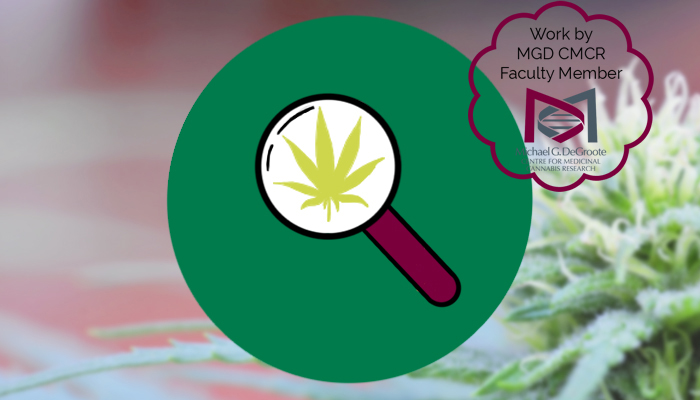What does the evidence state about cannabis use among military veterans?

Why was this study conducted? What does this study add? Is there anything else I should know? Turna J, MacKillop J. Cannabis use among military veterans: A great deal to gain or lose? Clinical Psychology Review 2021; available online 11/1/2021
Turna J, MacKillop J. Cannabis use among military veterans: A great deal to gain or lose? Clinical Psychology Review 2021; available online 11/1/2021 . (abstract; available online 11/1/2021).
Stevens AK, Gunn RL, Jackson KM, Borsari B, Metrike J. Examining motivational pathways from adult attention-deficit/hyperactivity disorders symptoms to cannabis use: Results from a prospective study of veterans. Psychology of Addictive Behaviors: advance online publication (abstract; full article publicly available 9/3/21)
Metrik J, Stevens AK, Gunn RL, Borsari B, Jackson KM. Cannabis use and posttraumatic stress disorder: prospective evidence from a longitudinal study of veterans. Psychological Medicine 2020:1-11. Doi: 10.1017/S003329172000197X (abstract)
Gunn RL, Stevens AK. Micalizzi L, Jackson KM, Borsari B, Metrik J. Longitudinal associations between negative urgency, symptoms of depression, cannabis and alcohol use in veterans. Exper Clin Psychopharm 2020; 28(4):426-437. DOI: 10.1037/pha0000357 PMID: 32134284. (abstract; full article available after 31/7/2021).
Why was this study conducted?
As a group, veterans are both disproportionately affected by conditions for which cannabis is thought to have a positive or medicinal effect, such as chronic pain and post-traumatic stress disorder (PTSD), and more likely to use cannabis than their civilian peers. The Turna and MacKillop systematic review summarizes 86 articles published between 1990 and the end of 2019 discussing:
- Epidemiology: point prevalence of cannabis use and cannabis use disorder (CUD) during active duty and after transition to civilian life, user characteristics, relationship/co-occurrence with alcohol use, and factors promoting or impeding cessation attempts
- Contribution to the prevalence or management of mental health disorders: PTSD, depression and anxiety, self-harm, sleep, and other conditions
- Use in the management of physical health issues: pain and human immunodeficiency virus (HIV)
What does this study add?
Due to limitations in the data, meta-analyses could not be conducted, so Turna and McKillop presented a detailed summary of the literature. The overall conclusion of the authors is that as of the time of the publication, there is insufficient data to support cannabis as an effective treatment for veterans’ mental and physical health challenges and that it may even pose a risk for harm (e.g., positive associations with other substance use, psychiatric disorders, and self-harm/suicidality). However, the authors acknowledge that two-thirds of the studies available for analysis were cross-sectional, thereby making it difficult to look at the direction of the relationships between cannabis use and health outcomes.
The articles by Stevens et al (2020), Metrik et al (2020), and Gunn et al (2020) were published subsequent to the Turna and McKillop article. As they report on longitudinal data, they could help fill gaps in our understanding of the temporal relationships between cannabis and specific mental health challenges. All three articles were developed from the same prospective study of a sample of 361 American veterans (93% male, 80% white, and with a mean age of 33.6 years [sd=9.44]) who completed in-person screenings and met the inclusion criteria, including that they had used cannabis at least once in their lifetime. An earlier publication by the authors reports that participants lived in states that had legalized medicinal cannabis but did not indicate whether this was a means of accessing it. Participants were interviewed at baseline, 6 months, and 12 months and study retention over time was good (85.9% at 12 months). Based on structural equation modelling, the authors concluded:
-
- The evidence that cannabis leads to worsening PTSD symptoms is much stronger than that PTSD leads to cannabis use; however, there is also evidence that baseline PTSD predicts CUD at 12 months (Metrik et al.).
- For veterans with ADHD, the primary motivator for using cannabis may be the desire to regulate sleep; in addition, there appears to be a causal relationship between the desire to cope with the negative affect associated with ADHD and severity of later cannabis disorders (Stevens et al.).
- Cannabis use at 6 months predicted greater severity of depressive symptoms at 12 months; as well, interaction between symptoms of depression and negative urgency at 6 months predicted more frequent alcohol use at 12 months (Gunn et al.).
Is there anything else I should know?
Although the longitudinal studies had limitations (e.g., they were conducted among a single, modest-sized study population, did not collect data on cannabis dose, administration, or potency, and have yet to be replicated), they support the cautionary tone of the conclusions reached by Turna and MacKillop on the nature of the relationship between cannabis and PTSD, substance use, and depression. The quality of a systematic review is dependent upon the quality of the research studies available for analysis: more and better research is needed to support more definitive conclusions when it comes to understanding the causal relationships between cannabis and the mental and physical health challenges of veterans.
Cannabis News, Latest, Research - Addictions and Mental Health, Research - Pain, Veterans